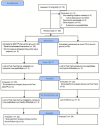Cognitively-Based Compassion Training (CBCT®) in Breast Cancer Survivors: A Randomized Clinical Trial Study
- PMID: 29681185
- PMCID: PMC6142100
- DOI: 10.1177/1534735418772095
Cognitively-Based Compassion Training (CBCT®) in Breast Cancer Survivors: A Randomized Clinical Trial Study
Abstract
Context: Breast cancer (BC) requires a significant psychological adaptation once treatment is finished. There is growing evidence of how compassion training enhances psychological and physical well-being, however, there are very few studies analyzing the efficacy of compassion-based Interventions on BC survivors.
Objective: To study the efficacy of the Cognitively-Based Compassion Training (CBCT) protocol in a BC survivor sample on quality of life, psychological well-being, fear of cancer recurrence, self-compassion, and compassion domains and mindfulness facets. Furthermore, enrollment, adherence, and satisfaction with the intervention were also analyzed.
Methods: A randomized clinical trial was designed. Participants (n = 56) were randomly assigned to CBCT (n = 28) or a treatment-as-usual control group (TAU; n = 28). Pre-post intervention and 6-month follow-up measures took place to evaluate health-related quality of life, psychological well-being; psychological stress, coping strategies, and triggering cognitions; self-compassion and compassion; and mindfulness in both intervention and wait-list groups.
Results: Accrual of eligible participants was high (77%), and the drop-out rate was 16%. Attendance to CBCT sessions was high and practice off sessions exceeded expectations). CBCT was effective in diminishing stress caused by FCR, fostering self-kindness and common humanity, and increasing overall self-compassion scores, mindful observation, and acting with awareness skillsets.
Conclusion: CBCT could be considered a promising and potentially useful intervention to diminish stress caused by FCR and enhance self-kindness, common humanity, overall self-compassion, mindful observation, and acting with awareness skillsets. Nevertheless, future randomized trials are needed and a process of deeper cultural adaptation required.
Trial registration: ClinicalTrials.gov NCT03305952.
Keywords: breast cancer; compassion training; contemplative training; fear of cancer recurrence; self-compassion; survivorship; well-being.
Conflict of interest statement
Figures
Similar articles
-
Cognitively-Based Compassion Training versus cancer health education to improve health-related quality of life in survivors of solid tumor cancers and their informal caregivers: study protocol for a randomized controlled pilot trial.Trials. 2019 Apr 29;20(1):247. doi: 10.1186/s13063-019-3320-9. Trials. 2019. PMID: 31036091 Free PMC article.
-
Feasibility of Cognitively-Based Compassion Training (CBCT) for breast cancer survivors: a randomized, wait list controlled pilot study.Support Care Cancer. 2015 Dec;23(12):3599-608. doi: 10.1007/s00520-015-2888-1. Epub 2015 Aug 16. Support Care Cancer. 2015. PMID: 26275769
-
The effectiveness of mindfulness-based stress reduction (MBSR) for survivors of breast cancer: study protocol for a randomized controlled trial.Trials. 2016 Apr 22;17(1):209. doi: 10.1186/s13063-016-1335-z. Trials. 2016. PMID: 27101823 Free PMC article. Clinical Trial.
-
Mindful self-compassion for psychological distress associated with skin conditions: An online intervention study.Indian J Dermatol Venereol Leprol. 2025 Jan-Feb;91(1):71-75. doi: 10.25259/IJDVL_451_2023. Indian J Dermatol Venereol Leprol. 2025. PMID: 38314971 Clinical Trial.
-
Physical Activity and Self-Compassion: A Systemic Review.Am J Lifestyle Med. 2023 Dec 15;19(1):47-57. doi: 10.1177/15598276231222183. eCollection 2025 Jan. Am J Lifestyle Med. 2023. PMID: 39822319 Free PMC article. Review.
Cited by
-
A Randomized Controlled Trial of a Culturally Adapted, Community-Based, Remotely Delivered Mindfulness Program for Latinx Patients With Breast Cancer is Acceptable and Feasible While Reducing Anxiety.Glob Adv Integr Med Health. 2024 Aug 16;13:27536130241274240. doi: 10.1177/27536130241274240. eCollection 2024 Jan-Dec. Glob Adv Integr Med Health. 2024. PMID: 39157776 Free PMC article.
-
Learning Compassion and Meditation: A Mixed-Methods Analysis of the Experience of Novice Meditators.Front Psychol. 2022 Apr 5;13:805718. doi: 10.3389/fpsyg.2022.805718. eCollection 2022. Front Psychol. 2022. PMID: 35450333 Free PMC article.
-
Evidence for the Role of Mindfulness in Cancer: Benefits and Techniques.Cureus. 2019 May 9;11(5):e4629. doi: 10.7759/cureus.4629. Cureus. 2019. PMID: 31312555 Free PMC article. Review.
-
Mindfulness-based psychosocial interventions and psychological wellbeing in cancer survivorship: a meta-analysis.Health Psychol Rev. 2024 Dec;18(4):723-749. doi: 10.1080/17437199.2024.2336014. Epub 2024 Apr 1. Health Psychol Rev. 2024. PMID: 38561221 Free PMC article. Review.
-
Behavior change theory and behavior change technique use in cancer rehabilitation interventions: a secondary analysis.Eur J Phys Rehabil Med. 2024 Dec;60(6):1036-1050. doi: 10.23736/S1973-9087.24.08452-1. Epub 2024 Oct 24. Eur J Phys Rehabil Med. 2024. PMID: 39445735 Free PMC article.
References
-
- Ferlay J, Soerjomataram I, Dikshit R, et al. Cancer incidence and mortality worldwide: sources, methods and major patterns in GLOBOCAN 2012. Int J Cancer. 2015;136:E359-E386. - PubMed
-
- Nasser M, Baistow K, Treasure J. The Female Body in Mind: The Interface Between the Female Body and Mental Health. New York, NY: Routledge; 2007.
-
- Moorey S, Greer S. Cognitive Behaviour Therapy for People With Cancer. New York, NY: Oxford University Press; 2002.
-
- Bellver A, Sánchez-Cánovas J, Santaballa A, Munárriz B, Pérez-Fidalgo JA, Montalar J. Mujeres con cáncer de mama: evaluación del afecto positivo y negativo y valoración de un programa de intervención psicológica en el ámbito hospitalario. Psicooncología. 2009;6:139-154.
-
- Rosenfeld B, Krivo S, Breitbart W, Chochinov HM. Suicide, assisted suicide, and euthanasia in the terminally ill. In: Chochinov HM, Breitbart W. eds. Handbook of Psychiatry in Palliative Medicine. New York, NY: Oxford University Press; 2000:51-62.
Publication types
MeSH terms
Associated data
LinkOut - more resources
Full Text Sources
Other Literature Sources
Medical


